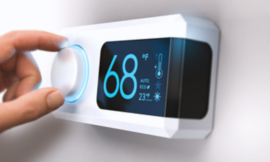The Indian air conditioner market has witnessed significant growth in recent years, with the emergence of smart air conditioners contributing to this upward trend. The smart air conditioner market in India holds immense potential and is poised for substantial growth in the coming years.

Understanding Smart Air Conditioners
Smart air conditioners are advanced appliances that integrate Internet of Things (IoT) and artificial intelligence (AI) technologies to provide enhanced functionality and convenience. These cutting-edge devices are capable of automatically adjusting temperature settings based on user preferences and weather conditions, optimizing energy consumption, and enabling remote control through smartphone applications.
Benefits of smart air conditioners over traditional models include:
- Energy Efficiency: Smart ACs utilize advanced algorithms to efficiently cool spaces, minimizing energy waste and reducing electricity bills.
- Convenience: With the IoT integration, users can control their ACs remotely, set temperature schedules, and receive real-time energy consumption statistics.
- Environmental Friendliness: By optimizing energy usage, smart air conditioners contribute to a more sustainable future, reducing carbon emissions and the ecological footprint.
Smart Air conditioner Market Analysis: Current Trends and Size
The Indian smart AC market has experienced remarkable growth in recent years, driven by various factors. The market size is expected to expand significantly in the foreseeable future due to rising awareness and demand for smart home appliances, increasing disposable incomes, and urbanization.
Some key factors driving the adoption of smart air conditioners in India include:
- Technological Advancements: Rapid advancements in AI, IoT, and automation technologies have made smart ACs more accessible and affordable for consumers.
- Energy Efficiency Initiatives: Government initiatives promoting energy-efficient appliances have created awareness among consumers, encouraging the adoption of smart ACs.
- Environmental Consciousness: The growing awareness of the need to protect the environment has motivated consumers to choose energy-efficient and sustainable products.
The Indian smart AC market features a highly competitive landscape with various major players, including established brands and emerging companies. These market players continuously strive to innovate and offer new features and technologies to stay ahead of the race.
Technological Advancements in Smart Air Conditioning
Innovation in smart air conditioning technology has paved the way for highly efficient and sustainable cooling solutions. Some notable advancements include:
- Energy Efficiency and Sustainability Features: Smart ACs now come equipped with advanced features, such as intelligent temperature sensors, which optimize energy consumption based on room occupancy and outdoor weather conditions. Additionally, some models incorporate eco-friendly refrigerants to minimize environmental impact.
- Smart Thermostats and Temperature Control Systems: These innovative features enable precise temperature control and personalized comfort settings. Users can adjust temperature settings remotely using their smartphones or through voice commands with the integration of virtual voice assistants like Amazon Alexa or Google Assistant.
- Integration with Smart Home Automation and Voice Control: Smart ACs can seamlessly integrate with comprehensive home automation systems, enabling users to control multiple devices simultaneously. This integration allows for complex scheduling and coordination of appliances, creating a truly interconnected and intelligent home environment.
Market Segmentation
The Indian market offers a wide variety of smart air conditioners catering to different consumer preferences. The following are the major types of smart ACs available in India:
- Window Smart Air Conditioners: These units are designed to be installed in windows and are ideal for smaller spaces or for those who prefer a portable solution.
- Split Smart Air Conditioners: Split ACs are the most common type and consist of two separate units – an indoor unit and an outdoor unit. They offer better cooling efficiency and are suitable for larger rooms or areas.
- Portable Smart Air Conditioners: Portable ACs provide flexibility as they can be moved around and do not require permanent installation. They are especially useful in situations where multiple rooms need cooling or for on-the-go cooling needs.
The demand for smart ACs varies based on room size and cooling capacity preferences. Consumers with smaller spaces tend to prefer window and portable ACs, while split ACs are more popular for cooling larger areas.
Factors Influencing Market Growth
Several factors are instrumental in driving the growth of the Indian smart AC market:
- Rising Disposable Incomes and Changing Lifestyles: The increase in disposable incomes among Indian consumers has led to a higher demand for modern home appliances. Additionally, changing lifestyles and growing aspirations for a comfortable living environment have fueled the adoption of smart ACs.
- Government Initiatives Promoting Energy-Efficient Appliances: The Indian government has implemented various measures to encourage the adoption of energy-efficient appliances. These initiatives, including the star rating system for appliances, have created awareness among consumers, making them more inclined to choose smart ACs.
- Increasing Awareness of Environmental Preservation: The rising global awareness of environmental preservation has influenced consumer choices in favor of energy-efficient and sustainable appliances. Smart ACs, with their advanced energy-saving technologies, align with these environmental consciousness trends.
Challenges and Opportunities
While the Indian smart AC market holds immense potential, it also faces a set of challenges that need to be addressed for sustainable growth:
1: Affordability and Price Competitiveness: Smart ACs are generally priced higher compared to traditional models, limiting their adoption among price-sensitive consumers. However, with advancements in technology and economies of scale, the prices are expected to decrease, making smart ACs more accessible.
2: Infrastructure Limitations and Connectivity Issues: The seamless functioning of smart ACs relies on robust internet connectivity and infrastructure. In regions with limited connectivity, the adoption of smart ACs may be hindered. However, with the government’s push for digital infrastructure development, these challenges are expected to be overcome gradually.
3: Strategies to Overcome Barriers and Leverage Opportunities: To address these challenges, market players must focus on building brand value, creating awareness about the benefits of smart ACs, and offering competitive pricing strategies. Partnerships and collaborations with technology and connectivity providers can also enhance market penetration and overcome infrastructure limitations.
Market Forecast: Trends and Projections till 2027
The Indian smart AC market is expected to witness robust growth in the coming years. The market is projected to expand in terms of both revenue and units. Several factors are likely to fuel this growth:
Technological Advancements: As technology continues to evolve, smart ACs are expected to become more advanced, energy-efficient, and affordable. Features like machine learning and predictive algorithms will revolutionize cooling solutions, enhance the user experience, and drive market growth.
Regional Analysis and Growth Potential: The growth potential of the smart AC market in India varies across regions. Metropolitan cities and urban areas, where disposable incomes and technological awareness are higher, are expected to exhibit faster adoption rates. However, with increasing urbanization and infrastructure development, the market is likely to grow in Tier-II and Tier-III cities as well.
Consumer Preferences and Purchase Patterns
Indian consumers consider various factors when purchasing smart air conditioners. Some key considerations include:
Energy Efficiency: Energy savings and cost-effectiveness are major factors for Indian consumers. Smart ACs with high energy efficiency ratings tend to be preferred.
Popular Brands and Features: Established brands that provide reliability and excellent after-sales service are preferred by consumers. Desired features include advanced temperature control, intelligent scheduling, and compatibility with smart home ecosystems.
Online vs. offline sales channels and e-commerce trends: Online sales channels, including e-commerce platforms, have gained popularity among Indian consumers. The convenience of browsing and comparing different brands and models, along with attractive discounts, has led to an increase in online purchases.
Environmental Impact and Energy Efficiency
The adoption of energy-efficient smart air conditioners is crucial for a sustainable future. Smart ACs with higher energy ratings contribute significantly to energy conservation and the reduction of carbon footprints.
Energy ratings play a considerable role in consumer choices as they provide valuable information on the energy efficiency of appliances, enabling consumers to make informed decisions.
Future Trends and Innovations
The future of the smart AC industry in India looks promising, with some exciting developments on the horizon:
Integration of Machine Learning and Predictive Algorithms: Smart ACs will become more intelligent, learning from user behavior and environmental factors to optimize cooling performance and energy consumption efficiently.
Potential for Smart ACs in Commercial and Industrial Sectors: The benefits offered by smart ACs extend beyond residential usage. The commercial and industrial sectors are likely to witness the adoption of smart air conditioning systems for energy savings and enhanced comfort.
Impact of COVID-19 on the Market
The COVID-19 pandemic has had both short-term disruptions and long-term implications for the smart AC industry in India. The initial disruption caused by lockdowns and restrictions affected manufacturing and the supply chain, leading to a temporary decline in market growth.
However, the pandemic has also brought about changes in consumer behavior and preferences, with an increased focus on home comfort and indoor air quality. Industry players have adapted to the crisis by emphasizing hygiene features and remote control options to address customer concerns.
Strategies for Market Players
To thrive in the competitive Indian smart AC market, manufacturers and suppliers should consider the following strategies:
Product differentiation and value-added services: Offering unique features and advantages can help companies stand out from the competition. Additionally, providing value-added services, such as extended warranties and seamless customer support, can build customer loyalty.
Embracing Partnerships and Collaborations: Collaborating with technology providers, real estate developers, and energy companies can open new avenues for market expansion. Strategic partnerships enable the integration of smart ACs with existing smart home ecosystems, providing added value to consumers.
Summary and Conclusion
The Indian smart air conditioner market is experiencing remarkable growth, driven by technological advancements, changing consumer preferences, and government initiatives. Smart ACs provide enhanced energy efficiency, convenience, and environmental friendliness compared to traditional models.
With the potential for further innovation and market expansion, the future looks promising for the Indian smart AC market. Market players need to adapt and innovate to meet evolving consumer demands while addressing challenges posed by affordability, infrastructure limitations, and connectivity issues.
FAQ Section
What is a smart air conditioner, and how does it differ from a traditional AC?
A smart air conditioner is an advanced appliance that integrates IoT and AI technologies to provide enhanced functionality and convenience. It can be controlled remotely through smartphone apps and voice commands, offers energy-saving features, and optimizes cooling based on user preferences and weather conditions. In contrast, traditional ACs lack these smart capabilities and are manually operated.
What are the advantages of using smart air conditioners?
Smart air conditioners offer several advantages over traditional models, including energy efficiency, convenience of remote control, integration with smart home ecosystems, and reduced environmental impact through optimized energy consumption and eco-friendly features.
What are the factors driving the growth of the Indian smart AC market?
The growth of the Indian smart AC market is driven by technological advancements, increasing disposable incomes, changing lifestyles, government initiatives promoting energy-efficient appliances, and rising awareness of environmental preservation.
How are smart ACs integrated with home automation systems?
Smart ACs can seamlessly integrate with home automation systems through wireless connectivity and IoT technology. This integration allows users to control their ACs along with other smart devices in their homes, creating a synchronized and intelligent living environment. Voice control through virtual voice assistants like Amazon Alexa or Google Assistant is also possible with smart ACs.
What are the challenges faced by the Indian smart AC market?
The affordability and price competitiveness of smart ACs compared to traditional models pose a challenge for their widespread adoption. Additionally, infrastructure limitations and connectivity issues in some regions hinder the seamless functioning of smart ACs.
How do energy ratings impact consumer choices for smart ACs?
Energy ratings play a significant role in consumer choices for smart ACs. Higher energy ratings indicate better energy efficiency and cost-effectiveness, making appliances more attractive to consumers conscious of energy savings and environmental impact.
How has the COVID-19 pandemic affected the smart AC industry in India?
The COVID-19 pandemic has caused short-term disruptions and long-term implications for the smart AC industry in India. The initial disruption affected manufacturing and supply chains. However, consumer behavior has shifted towards a greater focus on home comfort and indoor air quality, leading to increased demand for smart ACs. Industry players have adapted by emphasizing hygiene features and remote control options to address changing customer preferences.

